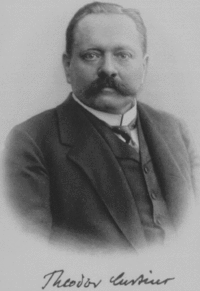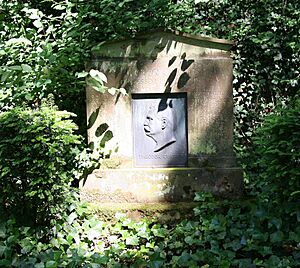Theodor Curtius facts for kids
Quick facts for kids
Theodor Curtius
|
|
|---|---|

Theodor Curtius, approx. 1880
|
|
| Born |
Julius Wilhelm Theodor Curtius
27 May 1857 |
| Died | 8 February 1928 (aged 70) Heidelberg, Weimar Republic
|
| Known for | Curtius rearrangement Büchner–Curtius–Schlotterbeck reaction |
| Scientific career | |
| Institutions | University of Heidelberg |
| Doctoral advisor | Hermann Kolbe |
Julius Wilhelm Theodor Curtius (born May 27, 1857 – died February 8, 1928) was a famous German chemist. He was a professor of Chemistry at Heidelberg University and other universities. He made several important discoveries.
Curtius developed a special chemical reaction. It is known as the Curtius rearrangement. He also discovered important chemical compounds. These include diazoacetic acid, hydrazine, and hydrazoic acid. In 1882, he was the first to create a peptide. Peptides are like small proteins.
Theodor Curtius: A Life in Chemistry
Theodor Curtius was born in Duisburg, Germany. He studied chemistry at two universities. First, he learned from Robert Bunsen at Heidelberg University. Then, he studied with Hermann Kolbe at Leipzig University. He earned his doctorate degree in Leipzig in 1882.
After his studies, Curtius worked for other famous chemists. From 1884 to 1886, he worked with Adolf von Baeyer in Munich. Then, he became the director of a chemistry department. This was at the University of Erlangen.
In 1889, he became a Chemistry Professor at the University of Kiel. He was very successful there. Because of his achievements, he was given the title of Geheimer Regierungsrat in 1895. This was a special title for important government advisors.
In 1897, he worked at Bonn University for a year. The next year, in 1898, he returned to his old university in Heidelberg. He became a Chemistry Professor there. He stayed at Heidelberg until he retired in 1926.
Besides his work, Theodor Curtius had many hobbies. He enjoyed composing music and singing in concerts. He was also an active mountaineer. In 1894, he even started a local group for German and Austrian mountain climbers. He supported this group with his own money. He was good friends with a mountain guide named Christian Klucker. They went on many climbing trips together.
Theodor Curtius passed away in Heidelberg on February 8, 1928.
The Heidelberg University Archives has a special photo album. It was made in 1907 to celebrate 25 years since Curtius received his doctorate. The album shows pictures of scientists, university buildings, and different labs. These included labs for physical chemistry, pharmacy, and organic chemistry.
See also
- Curtius
 | Precious Adams |
 | Lauren Anderson |
 | Janet Collins |


